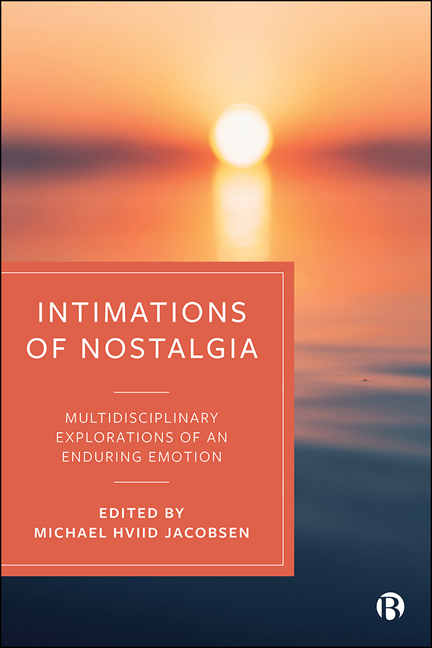Book contents
- Frontmatter
- Contents
- Notes on Contributors
- Preface and Acknowledgements
- Introduction: The Many Different Faces of Nostalgia – Exploring a Multifaceted and Multidisciplinary Emotion
- 1 Philosophy and Nostalgia: ‘Rooting’ within the Nostalgic Condition
- 2 History and Nostalgia: Historicizing a Multifaceted Emotion
- 3 Political Theory and Nostalgia: The Power of the Past in the History of Political Thought
- 4 Sociology and Nostalgia: Micro-, Meso-and Macro-level Dimensions of an Ambiguous Emotion
- 5 Psychology and Nostalgia: Towards a Functional Approach
- 6 Anthropology and Nostalgia: Between Hegemonic and Emancipatory Projections of the Past
- 7 Media Studies and Nostalgia: Media Philosophy and Nostalgizing in Times of Crisis
- 8 Marketing and Nostalgia: Unpacking the Past and Future of Marketing and Consumer Research on Nostalgia
- 9 Literature and Nostalgia: Vestiges of Paradise
- 10 Architecture and Nostalgia: The End of History, the End of the Future and the Prospect of Nostalgia
- Postscript: On Nostalgia of the Future and the Future of Nostalgia – Some Scattered Concluding Observations
- Index
Preface and Acknowledgements
Published online by Cambridge University Press: 13 May 2022
- Frontmatter
- Contents
- Notes on Contributors
- Preface and Acknowledgements
- Introduction: The Many Different Faces of Nostalgia – Exploring a Multifaceted and Multidisciplinary Emotion
- 1 Philosophy and Nostalgia: ‘Rooting’ within the Nostalgic Condition
- 2 History and Nostalgia: Historicizing a Multifaceted Emotion
- 3 Political Theory and Nostalgia: The Power of the Past in the History of Political Thought
- 4 Sociology and Nostalgia: Micro-, Meso-and Macro-level Dimensions of an Ambiguous Emotion
- 5 Psychology and Nostalgia: Towards a Functional Approach
- 6 Anthropology and Nostalgia: Between Hegemonic and Emancipatory Projections of the Past
- 7 Media Studies and Nostalgia: Media Philosophy and Nostalgizing in Times of Crisis
- 8 Marketing and Nostalgia: Unpacking the Past and Future of Marketing and Consumer Research on Nostalgia
- 9 Literature and Nostalgia: Vestiges of Paradise
- 10 Architecture and Nostalgia: The End of History, the End of the Future and the Prospect of Nostalgia
- Postscript: On Nostalgia of the Future and the Future of Nostalgia – Some Scattered Concluding Observations
- Index
Summary
When I was a young boy – at least as far as I am able to remember – I never felt nostalgic, perhaps because there was really not yet much life to look back upon and remember oh so fondly. Now, as an increasingly middle-aged man, nostalgia has crept its way into my life and has become a much more familiar feeling. I frequently find myself falling victim to nostalgia in the form of reminiscing, remembering and reimagining my own life and past. From my own personal experience, nostalgia can perhaps best be described as a sort of misty mood in which the present is shrouded in the foggy recollections of a long-since forgotten past. I am not always sure if the past I remember was in fact the way it is now being remembered or if it has been filtered through the selective sieve of time and is thus a gestalt of how I would have liked the past (and particularly my own past) to have been back then. So, in this way, the present book is to some degree the outcome of my own increasing awareness of the important role nostalgia plays in my own life and in my own attempt to understand this strange feeling.
Besides this personal testimony, nostalgia has also grown into quite a hot topic within many academic disciplines and research agendas. There has been a noticeable upsurge in publications devoted to the study of nostalgia, and in many ways we do now live in what Zygmunt Bauman has aptly called ‘an age of nostalgia’. My recently released edited volume titled Nostalgia Now: Cross-Disciplinary Perspectives on the Past in the Present (published by Routledge in 2020) is but one example of a more general trend within the social sciences to take nostalgia seriously as a promising and potent research topic in its own right. Despite the quite extensive list of academic disciplines covered in the present volume, not all angles of nostalgia have been covered. A chapter on nostalgia and the arts unfortunately did not pan out as planned, which was also the case with a chapter on economics and nostalgia. However, these omissions notwithstanding, this new book provides a comprehensive overview of how nostalgia has been conceptualized, treated and discussed within a number of social science and humanities disciplines.
- Type
- Chapter
- Information
- Intimations of NostalgiaMultidisciplinary Explorations of an Enduring Emotion, pp. viii - xPublisher: Bristol University PressPrint publication year: 2021



